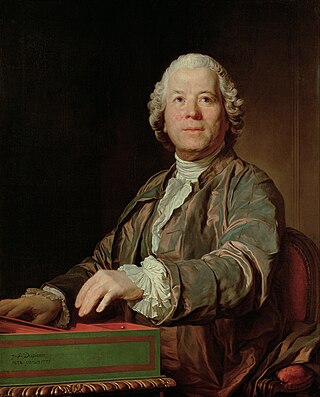
Christoph WillibaldGluck was a composer of Italian and French opera in the early classical period. Born in the Upper Palatinate and raised in Bohemia, both part of the Holy Roman Empire, he gained prominence at the Habsburg court at Vienna. There he brought about the practical reform of opera's dramaturgical practices for which many intellectuals had been campaigning. With a series of radical new works in the 1760s, among them Orfeo ed Euridice and Alceste, he broke the stranglehold that Metastasian opera seria had enjoyed for much of the century. Gluck introduced more drama by using orchestral recitative and cutting the usually long da capo aria. His later operas have half the length of a typical baroque opera. Future composers like Mozart, Schubert, Berlioz and Wagner revered Gluck.

Orfeo ed Euridice is an opera composed by Christoph Willibald Gluck, based on the myth of Orpheus and set to a libretto by Ranieri de' Calzabigi. It belongs to the genre of the azione teatrale, meaning an opera on a mythological subject with choruses and dancing. The piece was first performed at the Burgtheater in Vienna on 5 October 1762, in the presence of Empress Maria Theresa. Orfeo ed Euridice is the first of Gluck's "reform" operas, in which he attempted to replace the abstruse plots and overly complex music of opera seria with a "noble simplicity" in both the music and the drama.

Alceste, Wq. 37, is an opera by Christoph Willibald Gluck from 1767. The libretto was written by Ranieri de' Calzabigi and based on the play Alcestis by Euripides. The premiere took place on 26 December 1767 at the Burgtheater in Vienna.
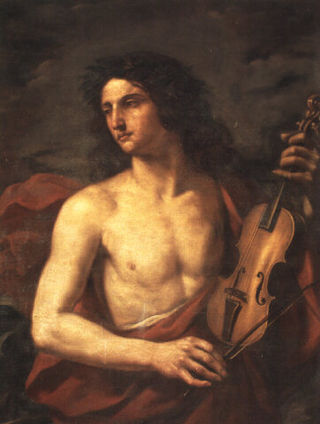
L'Orfeo, sometimes called La favola d'Orfeo[la ˈfaːvola dorˈfɛːo], is a late Renaissance/early Baroque favola in musica, or opera, by Claudio Monteverdi, with a libretto by Alessandro Striggio. It is based on the Greek legend of Orpheus, and tells the story of his descent to Hades and his fruitless attempt to bring his dead bride Eurydice back to the living world. It was written in 1607 for a court performance during the annual Carnival at Mantua. While Jacopo Peri's Dafne is generally recognised as the first work in the opera genre, and the earliest surviving opera is Peri's Euridice, L'Orfeo is the earliest that is still regularly performed.
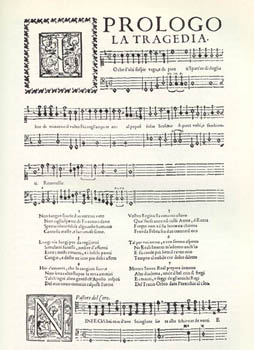
Euridice is an opera by Jacopo Peri, with additional music by Giulio Caccini. It is the earliest surviving opera, Peri's earlier Dafne being lost. The libretto by Ottavio Rinuccini is based on books X and XI of Ovid's Metamorphoses which recount the story of the legendary musician Orpheus and his wife Euridice.

Lucrezia Aguiari was an Italian coloratura soprano. She possessed an unusually agile voice with a large vocal range that spanned slightly more than three and a half octaves; faculties that enabled her to perform the most difficult passage work. In a letter dated 24 March 1770 Leopold Mozart wrote of hearing her perform a C an octave above high C at the Ducal opera of Parma, "I could not believe that she was able to reach C soprano acuto, but my ears convinced me." Aldous Huxley also mentioned this event in his novel Brave New World,.
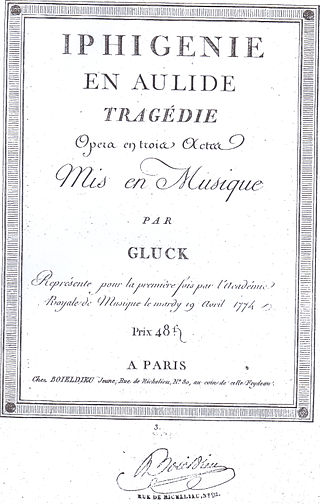
Iphigénie en Aulide is an opera in three acts by Christoph Willibald Gluck, the first work he wrote for the Paris stage. The libretto was written by François-Louis Gand Le Bland Du Roullet and was based on Jean Racine's tragedy Iphigénie, itself based on the play Iphigenia in Aulis by Euripides. It was premiered on 19 April 1774 by the Paris Opéra in the second Salle du Palais-Royal and revived in a slightly revised version the following year.
The French musical ensemble Les Talens Lyriques was created in 1991 in Paris, France, by the harpsichordist and orchestral conductor Christophe Rousset. This instrumental and vocal formation derives its name from the subtitle of Les fêtes d'Hébé (1739) an opera by Jean-Philippe Rameau.
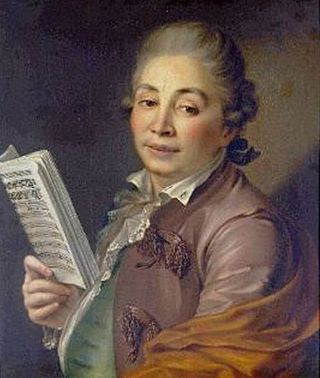
Vito Giuseppe Millico, called "Il Moscovita", was an Italian soprano castrato, composer, and music teacher of the 18th century who is best remembered for his performances in the operas of Christoph Willibald Gluck.

Bampton Classical Opera is an opera company based in Bampton, Oxfordshire and founded in 1993. It specialises in the production of lesser known opera from the Classical period. Performances are always sung in English. Opera today called the company 'ambitious, innovative and imaginative'.

La descente d'Orphée aux enfers H.488 is an incomplete chamber opera in two acts by the French composer Marc-Antoine Charpentier. It was probably composed in early 1686 and performed either in the apartments of the Dauphin that spring or at Fontainebleau in the autumn. Charpentier himself sang the title role, joined by musicians of Mademoiselle de Guise and members of the Dauphin’s little ensemble; it was Charpentier’s last appearance with this ensemble.

The ancient legend of Orpheus and Eurydice concerns the fateful love of Orpheus of Thrace for the beautiful Eurydice. Orpheus was the son of Apollo and the muse Calliope. It may be a late addition to the Orpheus myths, as the latter cult-title suggests those attached to Persephone. The subject is among the most frequently retold of all Greek myths, being featured in numerous works of literature, operas, ballets, paintings, plays and more recently, films and video games.
La morte d'Orfeo is an opera in five acts by the Italian composer Stefano Landi. Dedicated to Alessandro Mattei, familiaris of Pope Paul V, it may have been first performed in Rome in 1619. The work is styled a tragicomedia pastorale. The libretto, which may be by the composer himself, is in part inspired by La favola d'Orfeo (1484) by Angelo Poliziano. Unlike Monteverdi's L'Orfeo and the earliest Florentine operas on the subject, Landi's opera contains comic elements and deals with a different episode from the life of the mythical singer.

Eurydice was a character in Greek mythology and the Auloniad wife of Orpheus, whom Orpheus tried to bring back from the dead with his enchanting music.
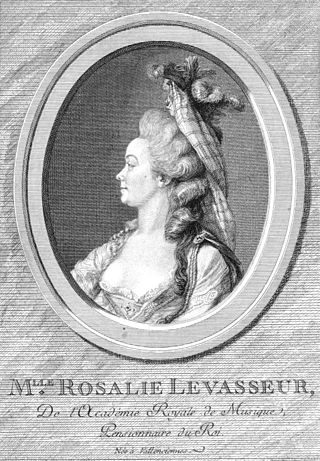
Marie-Rose-(Claude-)Josephe Levasseur, known in her day as Mademoiselle Rosalie, and later commonly referred to as Rosalie Levasseur was a French soprano who is best remembered for her work with the composer Christoph Willibald Gluck.
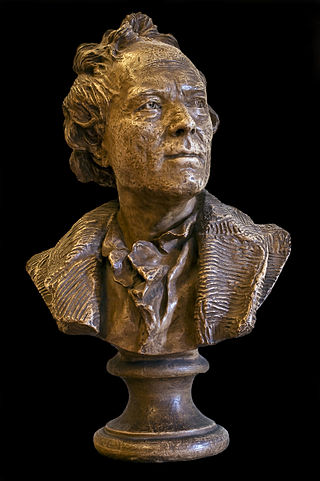
The following discography for Gluck's opera Orfeo ed Euridice is mainly based on the research of Giuseppe Rossi, which appeared in the programme notes to the performance of the work at the 70th Maggio Musicale Fiorentino in 2007, under the title "Discografia – Christoph Willibald Gluck – Orfeo ed Euridice ". Rossi's data has been checked against the sources referenced in the notes.

La corona is an opera by the composer Christoph Willibald Gluck. It takes the form of an azione teatrale in one act. The Italian-language libretto is by Pietro Metastasio. The opera was intended to celebrate the name day of Emperor Francis I on 4 October 1765 but the Emperor died in August and it remained unperformed until the 20th century. It was written for the four archduchess daughters of the Emperor, like Gluck's Il Parnaso confuso, premiered earlier that year at Schönbrunn Palace in Vienna.
















